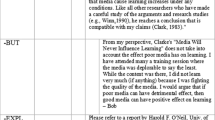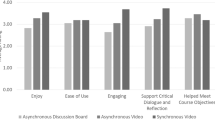Abstract
The purpose of this study was to examine the learning process exhibited in restrained online debates in terms of to what extent each of Bloom’s six levels of cognitive learning were exhibited among four types of message (argument, critique, evidence, and explanation). Thirty-three graduate students enrolled in an online entry-level course in distance learning participated in this study. The threaded discussion postings from four structured online debates were analyzed. The results indicated that five of the six levels of cognitive learning (except for knowledge learning) were achieved to a certain extent among the four types of postings. Chi square tests indicated that higher levels of learning were most likely to be exhibited in critique and argument postings. Message–response exchanges ending with critiques or starting with argument messages were most likely to elicit higher levels responses. The results were discussed in light of better understanding of student learning and implications for instructional designs of discussion topics and restraints.

Similar content being viewed by others
References
Baker, M. J. (2003). Computer-mediated argumentative interactions for the collaboration of scientific notions. In J. Anderiessen, M. J. Baker & D. Suthers (Eds.), Arguing to learn: Confronting cognitions in computer-supported collaborative learning environments (pp. 47–78). Dordrecht, The Netherlands: Kluwer Academic Publishers.
Bloom, B. (1956). Taxonomy of educational objectives: The classification of educational goals, by a committee of college and university examiners. In B. Bloom (Ed.), Handbook 1: Cognitive domain. New York: Longmans.
Cerbin, B. (1988). The nature and development of informal reasoning skills in college students. ERIC document No. ED 298 805.
Cho, K., & Jonassen, D. (2002). The effects of argumentation scaffolds on argumentation and problem solving. Educational Technology Research and Development, 50(3), 5–22.
Garrison, D. R., Anderson, T., & Archer, W. (2001). Critical thinking, cognitive presence, and computer conferencing in distance education. American Journal of Distance Education, 15(1), 7–23.
Gunawardena, C., Lowe, D., & Anderson, T. (1997). Analysis of a global online debate and the development of an interaction analysis model for examining social construction of knowledge in computer conferencing. Journal of Educational Computer Research, 17(4), 397–431.
Jeong, A., & Juong, S. (2007). Scaffolding collaborative argumentation in asynchronous discussions with message constraints and message labels. Computers and Education, 48, 427–445.
Kobbe, L., Weinberger, A., Dillenbourg, P., Harrer, A., Hamalaninen, R., & Fisher, F. (2007). Specifying computer-supported collaboration scripts. International Journal of Computer-Supported Collaborative Learning, 2(2–3), 211–224.
Kuhn, D. (1991). The skills of argument. Cambridge, England: Cambridge University Press.
Moore, J., & Marra, R. (2005). A comparative analysis of online discussion participation protocols. Journal of Research on Technology in Education, 38(2), 191–212.
Schellens, T., & Valcke, M. (2005). Collaborative learning in asynchronous discussion groups: What about the impact on cognitive processing? Computers in Human Behavior, 21(6), 957–976.
Stegmann, K., Weinberger, A., & Fischer, F. (2007). Facilitating argumentative knowledge construction with computer-supported collaboration scripts. Computer-Supported Collaborative Learning, 2, 421–447.
Toulmin, S. E. (1958). The uses of argument. Cambridge: University Press.
Valcke, M., de Wever, B., Zhu, C., & Deed, C. (2009). Supporting active cognitive processing in collaborative groups: The potential of Bloom’s taxonomy as a labeling tool. Internet and Higher Education, 12, 165–172.
Weinberger, A., Ertl, B., Fischer, F., & Mandl, H. (2005). Epistemic and social scripts in computer-supported collaborative learning. Instructional Science, 33(1), 1–30.
Author information
Authors and Affiliations
Corresponding author
Rights and permissions
About this article
Cite this article
Jin, L., Jeong, A. Learning achieved in structured online debates: levels of learning and types of postings. Instr Sci 41, 1141–1152 (2013). https://doi.org/10.1007/s11251-013-9269-2
Received:
Accepted:
Published:
Issue Date:
DOI: https://doi.org/10.1007/s11251-013-9269-2




